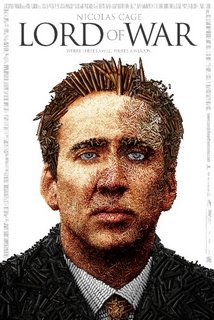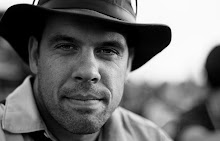Movie - Lord Of War - Directed by Andrew Niccol

From the moment you read about this movie, or see the trailer, you somehow know - deep in your gut - that this is not going to be a movie you go home feeling good about.
In the opening credits, in a sequence of bullet's-eye views (done in a similar fashion to the overused effect on CSI), we see its factory creation, its shipping and handling at different ports - each more questionable than the last, its arrival at the front line in some unnamed African village. We see thumb and forefinger pick it up and load it into a gun along with its peers. We look down the barrel as it seeks a target. Travelling with it as it is fired we see a boy. We enter the boy's beautiful, unblemished forehead. And we kill him.
If there's any doubt where Lord of War stands on the subject of international arms sales, it ends there in the red entry hole above a young boy's face. The image packs a raw shock. Somehow, in spite of the fact that this is exactly the sort of tactic that anyone with a brain would expect from the movie, it still makes you just the slightest bit uncomfortable sitting in your plush theatre seat with your butter-stained laps of complacentcy. And it's not merely for its assaultive POV but for the blame it drops onto...
Now wait... I don't feel any blame. All discussion about whether I should feel guilt for living in a First World country aside, I know that in the end of the day when I go to sleep the guilt that I created a bullet that killed someone half a world away doesn't weigh heavily on me. I don't work in that industry. I don't own a gun. I'm not generally in favour of violence on any level.
So why then should this scene still cause me to feel like the padding was suddenly stripped off my chair? Surely the movie is pulling this stunt in the credits to make me empathize with the poor and destitute.
Or is it? Lord of War may strike some as a pacifist's creed, and it is beyond doubt the harshest mainstream cinematic attack on the tangled morality of war in some time. Some who sit through this unflinching account of a gunrunner's global career will come away feeling sickened, guilty, indignant, baffled, or all of the above. But the film stops short of declaring war on warfare, or the men who condone and supply it.
There is no awakening for its central character — no pivotal aha when he forsakes his trade or regrets the deaths he's caused. Oh, it's hinted at... but in the end, the pragmatic, resolutely nonpartisan arms dealer played by Nicolas Cage, can't be bothered to follow a bullet into anyone's forehead, even if he sold it. He is, to his mind simply 'fulfilling another basic human need'.
The rest of the cast, who all deliver commendable performances, are comprised of his wife (the lovely Bridget Moynahan), his brother (Jared Leto) to the Interpol cop who's tailed him for years (Ethan Hawke). While I did not feel any of the actors had to exert themselves in their roles, they all play out their roles with a comfort that brings a certain sincerity to the parts. The film is not without its moments of humour either, and while somewhat dark at times, you can't help but smirk at some of the interplay between Yuri Orlov (Cage) and the people he deals with.
Niccol's films explore falsehood: The genetic deception at the heart of Gattaca, the virtual superstar in S1m0ne ('I am the death of real'). In The Truman Show, which he wrote, the protagonist himself is hoodwinked, but in every other film — all three that Niccol has written and directed — the main character is not the object but the agent of illusion. They traffic in lies.
So to though, all of his films don't draw lines in black and white. And it is this that I think causes the audience to shift uneasily in their chairs. In the end, you squirm uncomfortably because, deep down, you know that the lies you are watching on the screen are the sort of hazy gray areas that society hasn't figured out.
"Not so!" you proclaim. You are against the sale of guns to poor countries. Opposed to conflict diamonds! To drugs. To dictatorships.
Is that so? Then why do you live in a country that participates in weapons manufacture and trade?
You see, Lord of War is based on "actual events" and made with the input of gunrunners, and would like to speak the truth. Scenes of blunt atrocity are meant to jolt us, and they do. In spite of the fact that we should have been prepared for them, in spite of the fact we already knew... some mornings, it's not easy to look in the mirror when you can just look away instead.
In the opening credits, in a sequence of bullet's-eye views (done in a similar fashion to the overused effect on CSI), we see its factory creation, its shipping and handling at different ports - each more questionable than the last, its arrival at the front line in some unnamed African village. We see thumb and forefinger pick it up and load it into a gun along with its peers. We look down the barrel as it seeks a target. Travelling with it as it is fired we see a boy. We enter the boy's beautiful, unblemished forehead. And we kill him.
If there's any doubt where Lord of War stands on the subject of international arms sales, it ends there in the red entry hole above a young boy's face. The image packs a raw shock. Somehow, in spite of the fact that this is exactly the sort of tactic that anyone with a brain would expect from the movie, it still makes you just the slightest bit uncomfortable sitting in your plush theatre seat with your butter-stained laps of complacentcy. And it's not merely for its assaultive POV but for the blame it drops onto...
Now wait... I don't feel any blame. All discussion about whether I should feel guilt for living in a First World country aside, I know that in the end of the day when I go to sleep the guilt that I created a bullet that killed someone half a world away doesn't weigh heavily on me. I don't work in that industry. I don't own a gun. I'm not generally in favour of violence on any level.
So why then should this scene still cause me to feel like the padding was suddenly stripped off my chair? Surely the movie is pulling this stunt in the credits to make me empathize with the poor and destitute.
Or is it? Lord of War may strike some as a pacifist's creed, and it is beyond doubt the harshest mainstream cinematic attack on the tangled morality of war in some time. Some who sit through this unflinching account of a gunrunner's global career will come away feeling sickened, guilty, indignant, baffled, or all of the above. But the film stops short of declaring war on warfare, or the men who condone and supply it.
There is no awakening for its central character — no pivotal aha when he forsakes his trade or regrets the deaths he's caused. Oh, it's hinted at... but in the end, the pragmatic, resolutely nonpartisan arms dealer played by Nicolas Cage, can't be bothered to follow a bullet into anyone's forehead, even if he sold it. He is, to his mind simply 'fulfilling another basic human need'.
The rest of the cast, who all deliver commendable performances, are comprised of his wife (the lovely Bridget Moynahan), his brother (Jared Leto) to the Interpol cop who's tailed him for years (Ethan Hawke). While I did not feel any of the actors had to exert themselves in their roles, they all play out their roles with a comfort that brings a certain sincerity to the parts. The film is not without its moments of humour either, and while somewhat dark at times, you can't help but smirk at some of the interplay between Yuri Orlov (Cage) and the people he deals with.
Niccol's films explore falsehood: The genetic deception at the heart of Gattaca, the virtual superstar in S1m0ne ('I am the death of real'). In The Truman Show, which he wrote, the protagonist himself is hoodwinked, but in every other film — all three that Niccol has written and directed — the main character is not the object but the agent of illusion. They traffic in lies.
So to though, all of his films don't draw lines in black and white. And it is this that I think causes the audience to shift uneasily in their chairs. In the end, you squirm uncomfortably because, deep down, you know that the lies you are watching on the screen are the sort of hazy gray areas that society hasn't figured out.
"Not so!" you proclaim. You are against the sale of guns to poor countries. Opposed to conflict diamonds! To drugs. To dictatorships.
Is that so? Then why do you live in a country that participates in weapons manufacture and trade?
You see, Lord of War is based on "actual events" and made with the input of gunrunners, and would like to speak the truth. Scenes of blunt atrocity are meant to jolt us, and they do. In spite of the fact that we should have been prepared for them, in spite of the fact we already knew... some mornings, it's not easy to look in the mirror when you can just look away instead.

